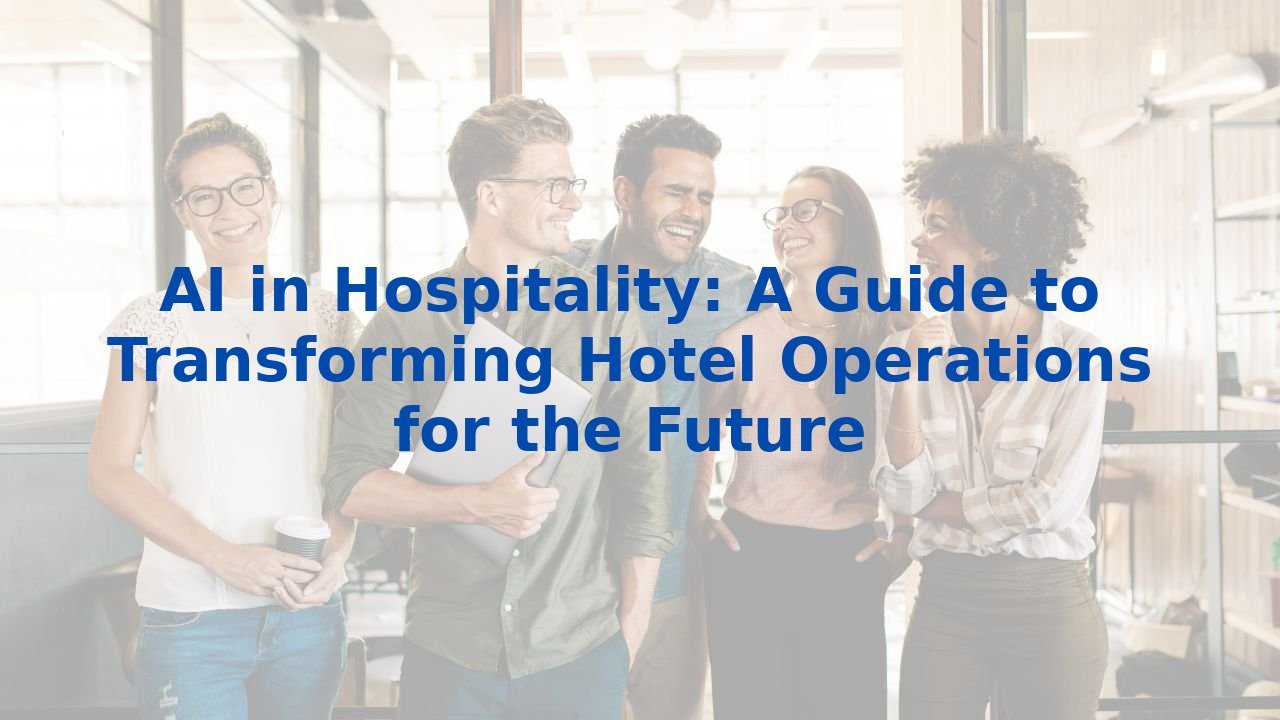AI in Hospitality: A Guide to Transforming Hotel Operations for the Future

AI in Hospitality: A Guide to Transforming Hotel Operations for the Future
In the rapidly changing landscape of hospitality, the promise of Artificial Intelligence (AI) stands out as a beacon of transformation. AI is set to redefine how hotels operate, interact with customers, and streamline business processes. By enhancing operational efficiency and customer experience, AI is not merely an add-on; it is becoming a core component of strategic hotel management.
Understanding AI in Hospitality
AI is an umbrella term that encompasses various technologies, such as machine learning and deep learning. These innovations are adept at analyzing large datasets, unearthing patterns, and facilitating predictive decision-making. With applications across multiple departments—front office, customer experience, food and beverage, and sustainability—AI offers a robust solution to meet modern challenges in the hospitality sector.
Enhancing Customer Experience
At the heart of AI's contribution to hospitality is its ability to customize and elevate customer experiences. Imagine a guest arriving at a hotel where every detail has already been tailored to their preferences. Through data analysis, hotels can gain insights into individual guest behaviors and preferences. AI-driven chatbots and virtual assistants can provide instant help and recommendations, ensuring guests feel heard and valued. This level of personalization not only enhances satisfaction but also fosters loyalty.
Optimizing Operations
Operational efficiency is paramount in the hospitality industry, and AI acts as a catalyst for significant improvement. Automating routine tasks—such as guest check-in, reservations, and concierge services—reduces human error and saves valuable time for staff. AI analytics empowers hotels to optimize inventory management, energy usage, and even waste reduction, leading to more sustainable practices.
Cost Optimization
Cost reduction while maintaining quality is a delicate balancing act. Here, AI shines as an effective tool for cost optimization. By assessing historical data and real-time trends, AI systems can pinpoint cost-saving opportunities. For instance, advanced predictive algorithms can help hotels anticipate demand fluctuations, enabling them to adjust pricing strategies proactively. Such insights empower hotel management to maximize revenue while minimizing unnecessary operational expenses, thus forming a proactive approach to financial health.
Sales and Marketing Automation
AI is revolutionizing sales and marketing strategies by introducing data-driven insights. By employing machine learning algorithms, hotels can conduct targeted marketing campaigns tailored to specific customer segments, boosting engagement levels. AI-powered chatbots facilitate instant communication, improving customer service and solidifying brand reputation. Accurate analytics further enable hotels to evaluate the success of marketing initiatives, thus enhancing future strategies based on solid data rather than intuition.
Training Employees for AI
While the advantages of AI are compelling, the human element shouldn't be overlooked. To harness the full potential of AI technology, hotels must invest in comprehensive training for their employees. A well-structured training program focuses on demystifying AI terminology, familiarizing staff with AI-driven systems, and developing methods to utilize these tools effectively in everyday operations. By empowering employees with the skills to integrate AI into their workflows, hotels can facilitate a smooth transition to an AI-enhanced environment.
Conclusion
In conclusion, the integration of AI into the hospitality industry is not just a trend; it is a transformative movement that promises improved efficiency and enriched customer experiences. By leveraging AI for personalized service delivery, streamlined operations, and optimized marketing strategies, hotels position themselves for sustained success. As the hospitality landscape continues to evolve, the role of AI will only grow in significance, shaping the future of hotel management into one that is intelligent, responsive, and customer-centric.
To delve deeper into the potential of AI for your hospitality business, consider exploring comprehensive training options that equip your entire workforce with the necessary skills. A proactive investment in training is an investment in your business's future.